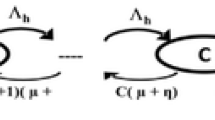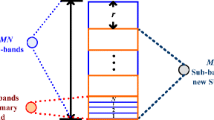Abstract
The Guard Channel Scheme (GCS) and Handoff Queueing Scheme (HQS) are the popular and practical strategies to prioritize handoff calls in wireless cellular networks. A key issue of giving handoff calls the higher priority is how to achieve a tradeoff among the handoff call blocking probability, new call blocking probability and handoff delay. This paper extends GCS and HQS and presents an efficient handoff scheme that dynamically manages the channels reserved for handoff calls depending on the current status of the handoff queue. A three-dimensional Markov model is developed to analyze the performance of this scheme and investigate the desirable performance tradeoff. The Poisson process and Markov-Modulated-Poisson-Process (MMPP) are used to model the arrival processes of new and handoff calls, respectively. The accuracy of this model is evaluated through the extensive comparison of the analytical results to those obtained from discrete-event simulation experiments. Performance measures in terms of the mean number of calls in the system, aggregate response time, aggregate call blocking probability, handoff call blocking probability, new call blocking probability and handoff delay are evaluated. The analytical model is used to investigate the effects of the number of channels originally reserved for handoff calls, the number of dynamic channels, and the ratio of the rate of handover calls to the aggregate arrival rate on the system performance.
Similar content being viewed by others
Explore related subjects
Discover the latest articles, news and stories from top researchers in related subjects.References
Du, W., Lin, L., Jia, W., & Wang, G. (2005). Modeling and performance evaluation of handover service in wireless networks. In Lecture notes in computer science : Vol. 3619. Proceedings of the international conference on computer networks and mobile computing (ICCNMC’2005) (pp. 229–238). Berlin: Springer.
Farahani, M. A., & Guizani, M. (2000) Markov modulated Poisson process model for hand-off calls in cellular systems. In Proceedings of the IEEE wireless communications and networking conference (WCNC’2000) (pp. 1113–1118).
Fischer, W., & Meier-Hellstern, K. (1993). The Markov-modulated Poisson process (MMPP) cookbook. Performance Evaluation, 18(2), 149–171.
Guerin, R. (1988). Queuing blocking system with two arrival streams and guard channels. IEEE Transactions on Communications, 36(2), 153–163.
Hong, D., & Rapaport, S. (1986). Traffic model and perfromance analysis for cellular mobile radio telephone systems with prioritized and nonprioritized handoff procedures. IEEE Transactions on Vehicular Technology, 35(3), 77–92.
Kleinrock, L. (1975). Queueing systems: compute applications (Vol. 1). New York: Wiley.
Louvros, S., Pylarinos, J., & Kotsopoulos, S. (2007). Handoff multiple queue model in microcellular networks. Computer Communications, 30(2), 396–403.
Ma, X., Cao, Y., Liu, Y., & Trivedi, K. S. (2006). Modeling and performance analysis for soft handoff schemes in CDMA cellular systems. IEEE Transactions on Vehicular Technology, 55(2), 670–680.
Min, G., & Ould-Khaoua, M. (2004). A performance model for wormhole-switched interconnection networks under self-similar traffic. IEEE Transactions on Computers, 53(5), 601–613.
Niyato, D., Hossain, E., & Alfa, A. S. (2004) Performance analysis of multi-service wireless cellular networks with MMPP call arrival patterns, In IEEE global communications conference (GLOBECOM’2004) (pp. 3078–3082).
Ogbonmwan, S., & Li, W. (2006). Multi-threshold bandwidth reservation scheme of an integrated voice/data wireless network. Computer Communications, 29(9), 1504–1515.
Paige, C. C., Styan, G. P. H., & Wachter, P. G. (1975). Computation of the stationary distribution of a Markov chain. Journal of Statistical Computation and Simulation, 4, 173–186.
Tekinay, S., & Jabbari, B. (1991). Handover and channel assignment in mobile cellular networks. IEEE Communications Magazine, 29(11), 42–46.
Vazuqez-Avila, J. L., Cruz-Perez, F. A., & Ortigoza-Guerrero, L. (2006). Performance analysis of fractional guard channel policies in mobile cellular networks. IEEE Transactions on Wireless Communications, 5(2), 301–305.
Wang, Z., & Mathiopoulos, P. (2005). On the performance analysis of dynamic channel allocation with FIFO handover queuing in LEO-MSS. IEEE Transactions on Communications, 53(9), 1443–1446.
Xhafa, A., & Tonguz, O. (2004). Dynamic priority queuing of handover calls in wireless networks. IEEE Journal Selected Areas in Communications, 22(5), 904–916.
Zhang, Y., Soong, B.-H., & Ma, M. (2003). Approximation approach on performance evaluation for guard channel scheme. Electronics Letters, 39(5), 465–467.
Zheng, J., & Regentova, E. (2005). QoS-based dynamic channel allocation for GSM/GPRS networks. In Lecture notes in computer science : Vol. 3779. Proceedings of the network and parallel computing (NCP’2005) (pp. 285–294). Berlin: Springer.
Author information
Authors and Affiliations
Corresponding author
Rights and permissions
About this article
Cite this article
Wang, L., Min, G. & Kouvatsos, D. Performance analysis of a dynamic handoff scheme in wireless networks with heterogeneous call arrival processes. Telecommun Syst 39, 157–167 (2008). https://doi.org/10.1007/s11235-008-9111-3
Published:
Issue Date:
DOI: https://doi.org/10.1007/s11235-008-9111-3




